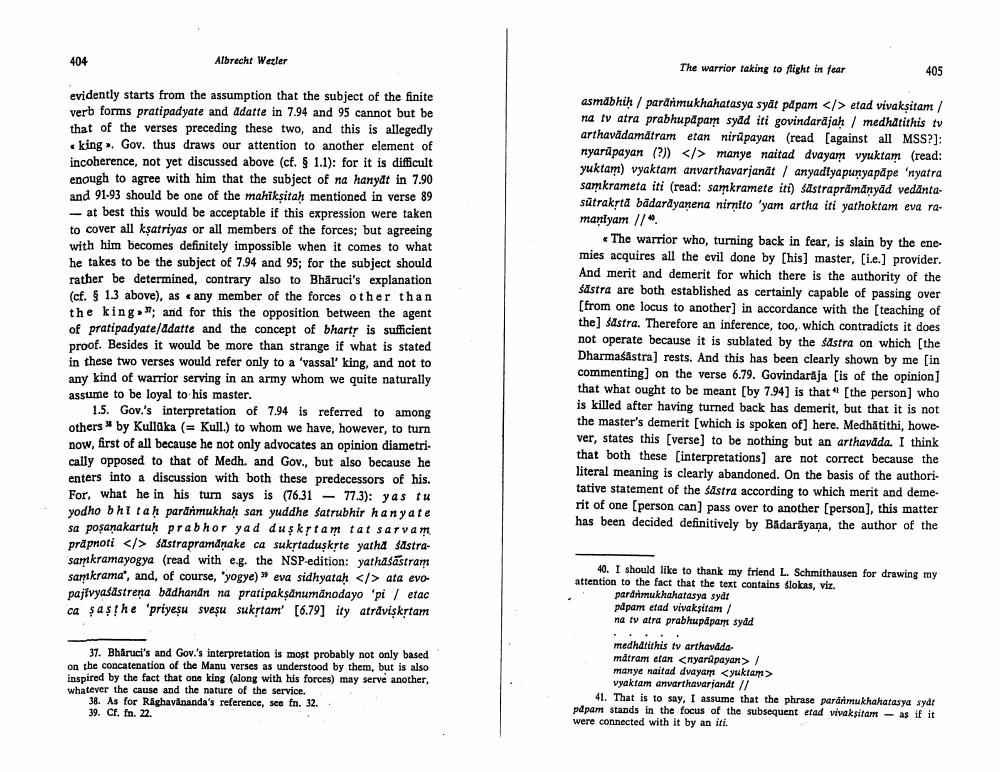________________
404
Albrecht Wetler
The warrior taking to fight in fear
405
evidently starts from the assumption that the subject of the finite verb forms pratipadyate and adatte in 7.94 and 95 cannot but be that of the verses preceding these two, and this is allegedly
king, Gov. thus draws our attention to another element of incoherence, not yet discussed above (cf. 1.1): for it is difficult enough to agree with him that the subject of na hanydt in 7.90 and 91-93 should be one of the mahiksitah mentioned in verse 89 - at best this would be acceptable if this expression were taken to cover all ksatriyas or all members of the forces, but agreeing with him becomes definitely impossible when it comes to what he takes to be the subject of 7.94 and 95; for the subject should rather be determined, contrary also to Bharuci's explanation (cf. § 13 above), as any member of the forces other than the king and for this the opposition between the agent of pratipadyate/Adatte and the concept of bharty is sufficient proof. Besides it would be more than strange if what is stated in these two verses would refer only to a 'vassal' king, and not to any kind of warrior serving in an army whom we quite naturally assume to be loyal to his master.
1.5. Gov.'s interpretation of 7.94 is referred to among others" by Kullaka (= Kull.) to whom we have, however, to turn now, first of all because he not only advocates an opinion diametri cally opposed to that of Medh, and Gov., but also because he enters into a discussion with both these predecessors of his. For, what he in his turn says is (76.31 - 77.3): yas tu yodho bhi tah pararmukhah san yuddhe satrubhir hanyate sa posanakartuh prabhor yad dusk tam tat sarvam praproti </> Sastrapramanake ca sukstaduskote yatha Sastrasartkramayogya (read with e.g. the NSP-edition: yathasastram samtkrama', and, of course, "yogye) eva sidhyatah </> ata evopajfvyasdstrena badhandn na pratipaksanumanodayo 'pi / etac ca şaşthe 'priyesu svesu sukstam' [6.79] ity atraviskstam
asmdbhih / pardnmukhahatasya syat papam </>etad vivaksitam / na tv atra prabhupapar sydd iti govindarajah / medharithis tv arthavādamátrametan nirūpayan (read (against all MSS?]: nyardpayan (?) </> manye naitad dvayam vyuktam (read: yuktam) vyaktam anvarthavarjanät / anyadiyapunyapåpe 'nyatra samkrameta iti (read: samkramete itt) sastraprdmanyäd vedantasätrakta bädardyanena nimito 'yam artha iti yathoktam eva ra. manlyam //
The warrior who, turning back in fear, is slain by the enemies acquires all the evil done by [his] master, [i.e.) provider. And merit and demerit for which there is the authority of the sastra are both established as certainly capable of passing over [from one locus to another) in accordance with the teaching of the) sastra. Therefore an inference, too, which contradicts it does not operate because it is sublated by the sastra on which the Dharmaśāstra) rests. And this has been clearly shown by me (in commenting) on the verse 6.79. Govindaraja [is of the opinion] that what ought to be meant [by 7.94) is that the person who is killed after having turned back has demerit, but that it is not the master's demerit (which is spoken of] here. Medhatithi, however, states this [verse] to be nothing but an arthavada. I think that both these [interpretations) are not correct because the literal meaning is clearly abandoned. On the basis of the authoritative statement of the sastra according to which merit and demerit of one (person can pass over to another (person), this matter has been decided definitively by Badarāyana, the author of the
40. I should like to thank my friend L. Schmithausen for drawing my attention to the fact that the text contains slokas, viz.
pardrimukhahatasya sydf papam etad vivaksiram/ na tv atra prabhupapan sydd
37. Bharuci's and Gov's interpretation is most probably not only based on the concatenation of the Manu verses as understood by them, but is also inspired by the fact that one king (along with his forces) may serve another, whatever the cause and the nature of the service.
38. As for Raghavananda's reference, sce fn. 32.. 39. Cf. fn. 22.
medhat this tv arthavddamatram elan <nyard payant / manye naitad dvayari yuktami >
vyaktam anvarthavariandi // 41. That is to say, I assume that the phrase pararmukhahatasya syde pdpam stands in the focus of the subsequent etad vivaksitam - as if it were connected with it by an iti.




